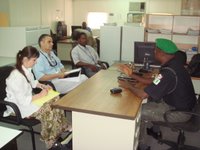I’m beginning my third full day in Nyala. I spent all of yesterday at the AMIS (African Union Mission in Sudan) CIVPOL (civilian police) compound interviewing trainers and former trainees. I also observed portions of an in-mission training.
The peacekeepers I met in this sector have come from Nigeria, Burundi, Cameroon and Ghana. I’m following the thread of trainings that they have undergone as police officers – first in their home countries and then upon deployment to Sudan. In this process, I’ve also had another world opened up to me: the life of a peacekeeper in Darfur. There are almost uncontrollable politics about the AMIS and controversies surrounding how well they have tried to implement their mandate, the restrictions of the mandate itself, and crippling internal administrative issues. Humanitarian agencies, UNMIS (United Nations Mission in Sudan) and AMIS itself is doing finger-pointing around how well the peacekeepers are protecting civilians. The firewood patrols have been successful in the past, but the disappointment of Sudanese civilians has transformed into attacks on the peacekeepers themselves. So they are less safe and doing less and less protection. The civilian police that I spoke with were frustrated and perhaps a little scared. The trainings they have undergone are an oasis from these problems and the monotony of sitting in their quarters (tents) most of the day.
There is an IDP (internally displaced persons) camp set up just outside the CIVPOL base. As a foreigner you can easily recognize the camps because the temporary shelters – the tents – are white. Villages are brown, the color of mud and sticks. When we were flying from Genaia to Nyala you could see vast expanses of white tents outlying village after village. To me, they looked permanent. I am told that they are also continuing to expand. I drove past the camp near the base and received friendly waves from the children and women along the road. We are scheduled to visit an IDP camp in order to speak with camp leaders about the work of AMIS but we need to get security clearance for this.
Security for everyone is a big issue in Darfur, and it is closely intertwined with the politics of the Sudanese government. Darfur’s conflict situation means, on the one hand, that you aren’t necessarily granted a visa to enter the country (many human rights and humanitarian agents are now prohibited from entering Sudan). If you are able to enter the country you cannot leave the capitol. (For example, U.S. citizens are officially not allowed to travel more than 25 kilometers outside of Khartoum.)
 I have the exceptional privilege of being able to travel because I am temporary UN staff. But even within the UN family, strict precautions are adhered to. Each sector of the country is ranked according to level of risk (all of the Darfur regions are rated at a level that would require UN personnel to be evacuated). Certain procedures you are expected to strictly adhere to, including curfews and radio check-ins every evening. Each UN person gets a radio phone for communication and the base checks in at 8 p.m. to make sure that all personnel are accounted for. Also, all internal travel must be approved. There are daily sitrep (situation representation) reports which provide information about incidents affecting security in each area. Thus from day to day, one may find that a trip you had planned to a village or sector must be cancelled.
I have the exceptional privilege of being able to travel because I am temporary UN staff. But even within the UN family, strict precautions are adhered to. Each sector of the country is ranked according to level of risk (all of the Darfur regions are rated at a level that would require UN personnel to be evacuated). Certain procedures you are expected to strictly adhere to, including curfews and radio check-ins every evening. Each UN person gets a radio phone for communication and the base checks in at 8 p.m. to make sure that all personnel are accounted for. Also, all internal travel must be approved. There are daily sitrep (situation representation) reports which provide information about incidents affecting security in each area. Thus from day to day, one may find that a trip you had planned to a village or sector must be cancelled.
It has been fascinating to work with a protection specialist. My initial expectation about working with Peter was that he would have good instincts about how to be cautious given his many years working in conflict areas. In fact – and understandably – when you are someone who has evacuated casualties and been through car attacks, gunfire and a hostage-situation in Gaza, you are much less likely to be bothered with minor inconveniences such as curfews. So I have been the one to urge Peter that we might NOT take a taxi at 9 p.m. in order to try to locate an Indian restaurant. Last night after I persuaded him that we should eat leftovers in the guesthouse we heard gunfire just outside on the street. This would be about the time we would have been returning by taxi. He has taken to calling me “mom” but I don’t mind.
